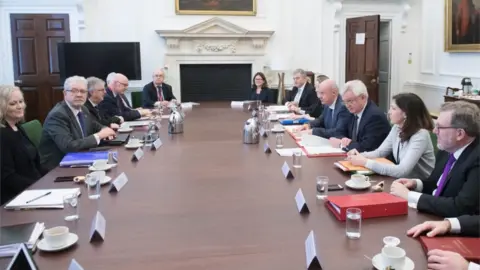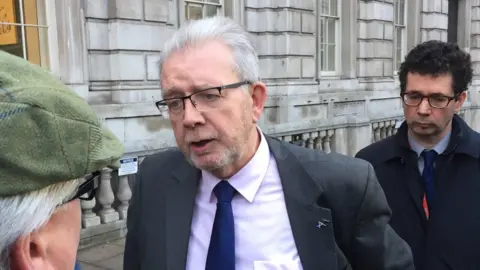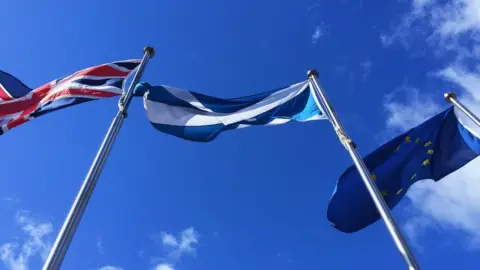'Difficult' devolved Brexit talks end without deal
 PA
PABrexit talks between ministers from the UK and devolved governments have once again ended without an agreement.
Politicians from across the UK met in London after Theresa May struck a deal to let the Brexit negotiations proceed.
Scottish Brexit minister Mike Russell said the "difficult" summit had not settled the matter of what happens to powers returning from Brussels.
But Scottish Secretary David Mundell insisted talks were moving forward and he was "sure" a deal could be found.
The Joint Ministerial Committee (JMC) meeting in London was attended by the UK government's First Secretary of State Damian Green and Brexit Secretary David Davis, as well as representatives from devolved administrations across the UK.
The prime minister has told MPs that the agreement to move on to the next phase of Brexit talks was "good news" for both Leave and Remain supporters, saying she was targeting a trade deal which is "right for the UK".
But Mr Russell wrote to Mr Green ahead of the meeting calling for "clarity" on what the deal to avoid a hard border in Northern Ireland could mean for the rest of the UK.
'Huge uncertainty'
Following the talks, which he described as "difficult", Mr Russell said "we need some answers" on how the agreement sealed by Mrs May in Brussels would affect future power-sharing frameworks.
He said: "Our preference is for Scotland and the UK to remain in the single market and customs union.
"However, I also made clear today that if it is possible to create a special arrangement between Northern Ireland and the European Union, there is no logical reason why Scotland should not have the same rights.
"It would be unacceptable for Scotland to be placed at an economic disadvantage."

The MSP also repeated a pledge that the Scottish government would put together its own Brexit legislation if "significant changes" are not made to the UK Withdrawal Bill.
The Scottish government has yet to put forward the bill for a consent vote at Holyrood - and Mr Russell said there needed to be a "cast iron commitment" that changes would be made.
The two governments are at odds over what happens to powers which are currently not reserved to Westminster, but which are exercised from Brussels, after the UK leaves the EU.
A series of meetings - including one between Mrs May and First Minister Nicola Sturgeon - has thus far failed to resolve the disagreement between the governments over the legislation, although both sides have cautiously welcomed "progress" in talks.
'Power grab'
Welsh ministers have joined their Scottish counterparts in describing the original plan, to bring the powers back to Westminster in the first instance before deciding on UK-wide frameworks for some, as a "power grab" of devolved responsibilities.
Scottish Secretary David Mundell has previously told MPs that changes will happen later in the legislative process.
And he told BBC Radio's Good Morning Scotland programme, that he was confident "the majority of powers" which are being disputed would actually head to Holyrood.
Following the meeting, he said: "I think we continue to make progress. There has been very significant work on the 111 powers that will come back from Brussels as a result of leaving the EU.
"There has been very detailed investigation of many of them and there is further work going on, for example in relation to fisheries.
"So I am sure that we are going to be able to reach an agreement with the Scottish government in relation to how those powers play out after we leave the EU."
 Getty Images
Getty ImagesThe Scottish and UK administrations also disagree strongly on the UK's future relationship with Europe, with Mr Russell and the Scottish government backing full membership of the European single market and customs union.
Mrs May told MPs on Monday that leaving the EU would mean leaving the single market.
She also faced calls for "clarity" from Labour leader Jeremy Corbyn, replying that she had set out "very clearly" what her government was seeking from Brexit.
The prime minister said the UK would pay a "fair" sum to settle financial commitments, avoid a hard border between Northern Ireland and the Republic of Ireland, and see the rights of UK and EU expat citizens "enshrined in UK law and enforced by British courts".
She was also questioned by the SNP's Westminster leader Ian Blackford, who said that any special arrangements applying to Northern Ireland should also be available for Scotland.
Mrs May replied that Northern Ireland was "in a different position" from Scotland due to the land border with EU member state Ireland, and pointed to other "unique, specific solutions" which exist on the island, such as the common electricity market.